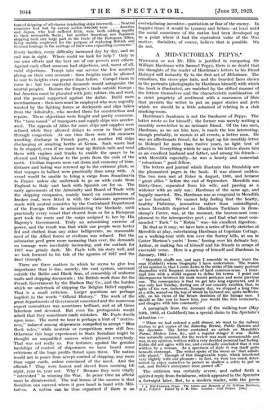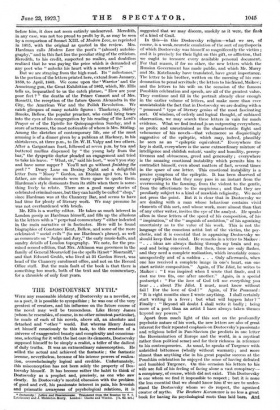A MID-VICTORIAN PEPYS.*
WHETHER or not Mr. Ellis is justified in comparing Sir William Hardman with Samuel Pepys, there is no doubt that
the thoughts of the reader of Hardman's letters to his friend Holroyd will instantly fly to the first act of Milestones. The crinolines, the stove-pipe hats, and the bearded faces shown
in the portraits (photographs by Hardman himself) with which the book is illustrated, are matched by the stilted manner of the letters themselves and the characteristic combination of a strict propriety of sentiment with a coarseness of fibre that permits the writer to put on paper stories and jests
which we should be a little ashamed of relating in a club smoking-room.
Hardman's frankness is not the frankness of Pepys. The latter wrote as for himself ; the former was merely writing it monthly news-letter to an intimate friend. Of the two men,
Hardman, as we see him here, is much the less interesting; though probably, in morals at all events, a better man. He
was an affectionate friend, for he kept up his monthly letter to Holroyd for more than twelve years, no light test of affection. Everything which he says in his letters shows him
as an excellent husband and father, and among his friends—
with Meredith especially—he was a hearty and somewhat " robustious " good fellow.
The letters and journal which illustrate this friendship are the pleasantest pages in the book. It was almost sudden.
The two men met at Esher in August, 1861, and became " great allies " before the end of September. Meredith was thirty-three, separated from his wife, and passing as a widower with an only son : Hardman of the same age, and happily married. Mrs. Hardman was as congenial to Meredith as her husband. We cannot help feeling that the hearty, healthy Philistine, insensitive rather than unintelligent,
whom Meredith depicted as Blackburn Tuckham in Beau. champ's Career, was, at the moment, the heaven-sent com- plement to the introspective poet ; and that what most com- mended " Tuck " to " Robin " was—his excellent digestion.
Be that as it may, we have here a series of lively sketches of Meredith at play, entertaining Hardman at Copsham Cottage, on a walking-tour with him over the Surrey hills, at sea in Cotter Morison's yacht ' Irene,' fussing over his delicate boy, Arthur, or making fun of himself and his friends in scraps of execrable verse. Here is a group of himself and Hardman in January, 1862 :-
"Meredith chaffs me, and says I resemble in many ways the man (Cobbett) whose biography I have undertaken. The reason of his opinion is, that I come down in the midst of his many poetical rhapsodies with frequent morsels of hard common-sense. I inter- rupt him with a stolid request to define his terms. I point out discrepancies between his most recent sentence and some previous one. The consequence is that we get into long arguments, and it was only last Sunday, during one of our country rambles, that, in spite of the raw, inclement, January day, we stopped a long time at a stile, seated on the top of which he lectured me, quite ineffectu- ally, on his views of the future destinies of the human race. I should so like you to know him, you would like him immensely, and disagree with him constantly."
A paragraph from the account of the walking-tour (May , 24th, 1862, at Guildford) has a special claim to the Spectator's attention :— " When we had ordered a cold dinner, we went to the railway station to get copies of the Saturchly Review, Public Opinion and the Spectator. The latter contained an article on Meredith's Poems, Modern Love, dce., and a regular stinger it was. Robin was naturally annoyed, for the review was most unreasonable and was, in my opinion, written with a very decided personal bad feeling.. Robin did not agree with me, and eventually concluded that it was written by a woman. As a specimen of style it was itself quite beneath contempt. The writer spoke of the moon as that admir- able planet.' Enough of this disagreeable topic, which interfered very slightly with our pleasure : in fact, we were too much deter- mined to enjoy ourselves to permit so shallow a critic to put us out, and Robin's annoyance soon passed off."
The criticism was certainly severe, and called forth a spirited reply from Swinburne, which appeared in the Spectator a fortnight later. But, to a modern reader, with the poem • d Mid-Vidorian Prpys. The Letters and Memoirs of Sir William Hardman, M.A.. F.R.G.S. Edited by B. M. Ellis. Loudon : Cecil Palmer. I°-.5L1 • .
before him, it does not seem entirely undeserved. Meredith, in any ease, was not too proud to profit by it, as may be seen by a comparison of Sonnet XIIL of Modern Love, as reprinted in 1895, with the original as quoted in the review. Mrs. Hardman calls Modern Love the poet's " (almost) autobio- graphy," and in this fact lies the peculiar sting of the criticism. Meredith, to his credit, suspected no malice, and doubtless realized that he was paying the price which is demanded of any poet who " unlocks his heart with a sonnet-key."
But we are straying from the high-road. Its " milestones," in the portion of the letters printed here, extend from January, 1859, to April, 1863. We come upon the ' Warrior' and the Armstrong gun, the Great Exhibition of 1862, which, Mr. Ellis tells us, bequeathed to us the catch phrase, " How are your poor feet ? " the deaths of the Prince Consort and of Mrs. Rossetti, the reception of the future Queen Alexandra in the City, the American War and the Polish Revolution. We catch glimpses of many notable figures : Thackeray, Shirley Brooks, Bellew, the popular preacher, who could bring tears into the eyes of his congregation by his reading of the Lord's Prayer or of the Epistle for Quinquagesima Sunday, and a score of actresses, the most noticeable of whom is Mrs. Stirling. Among the sketches of contemporary life, one of the most amusing is of a dinner given by a publican at Hackney, in his shirtsleeves, at three p.m., to Dr. W. H. Valpy and two others. After a Gargantuan feast, followed at seven p.m. by tea and buttered muffins dispensed by " the young lady from the bar," the dyspeptic doctor pleaded an engagement and tried to take his leave. " What, sir," said his host, " won't you stay and have some supper ? You'll not go without finishing the pork ? " Drury Lane on Boxing Night and a delightful letter from " Mossy " Gordon, an Etonian aged ten, to his father, are choice morsels were there space to quote them. Hardman's style dismounts from its stilts when there is some- thing lively to relate. There are a good many stories of celebrated criminal cases, but they can hardly be called " shop," since Hardman was at the Chancery Bar, and seems to have had time for plenty of literary work. We may presume he was not overburdened with briefs.
Mr. Ellis is a worthy editor. He takes as much interest in London gossip as Hardman himself, and fills up the allusions in the letters with a " perpetual commentary " either indented in the main narrative or in footnotes. Here will be found biographies of Constance Kent, Bellew, and some of the more celebrated " social evils " (to use Hardman's phrase), as well as comments on " Judge and Jury," the early music-halls, and sundry details of London topography. We note, for the pro- mised second edition, that Mrs. Atkinson was governess in the family of General Mouravioff (so she spells it) not" Monraniff," and that Edward Grubb, who lived at 81 Gordon Street, was head of the Chancery enrolment office, and not on the Record Office staff. But the main fault of the book is that there is something too much, both of the text and the commentary, for a chronicle of only four years.











































 Previous page
Previous page